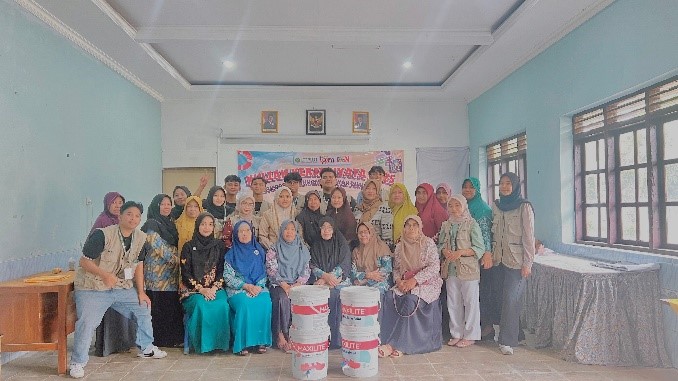
Wednesday, January 15, 2025, the PG 03 Real Work Lecture (KKN) group of Universitas Muhammadiyah Purworejo (UMPWR) has carried out extension activities on making liquid organic fertilizer with stacked bucket media in Roworejo Village. This activity is part of the KKN work program which aims to educate the village community about alternative fertilizers that are environmentally friendly and effective to improve the quality of their agriculture.
The purpose of this activity is to introduce liquid organic fertilizer as a solution to improve soil fertility, reduce dependence on chemical fertilizers, and introduce how to make liquid organic fertilizer that is easy and cheap. In addition, another goal is for farmers and villagers to better understand how to utilize the natural resources around them to produce fertilizers that are useful for agriculture.
The expected benefits of this activity are: (1) increasing public awareness of the importance of using environmentally friendly liquid organic fertilizers, (2) helping farmers reduce the cost of purchasing chemical fertilizers, (3) increasing soil fertility and agricultural yields in a sustainable manner, and (4) supporting environmental conservation efforts through the use of natural materials in agriculture.
The planning of this activity began with initial research on the needs of farmers in the village regarding liquid organic fertilizer. Based on the results of the observation, we planned to conduct counseling that included the theory of liquid organic fertilizer, its benefits, as well as how to make and use it. In addition, we also prepared the materials needed for a demonstration of making liquid organic fertilizer that could be practiced directly by the residents.
The implementation of this activity was carried out at the village hall on January 15, 2025. The event began after the women's PKK event, followed by counseling on liquid organic fertilizer, including how to make it, its benefits, and its application to plants. After the theoretical counseling, the participants were given the opportunity to follow the practice of making liquid organic fertilizer with available materials, such as organic waste from unused fruits and vegetables. This activity was attended by a group of farmers and villagers who were enthusiastic to learn.

Evaluation of this activity showed positive results. Most participants expressed a better understanding of the importance of liquid organic fertilizer and enthusiasm to implement its production and use on their farms. Some participants suggested further training on the use of liquid organic fertilizer on a larger scale, as well as more in-depth counseling on the sustainability aspects of org agriculture.